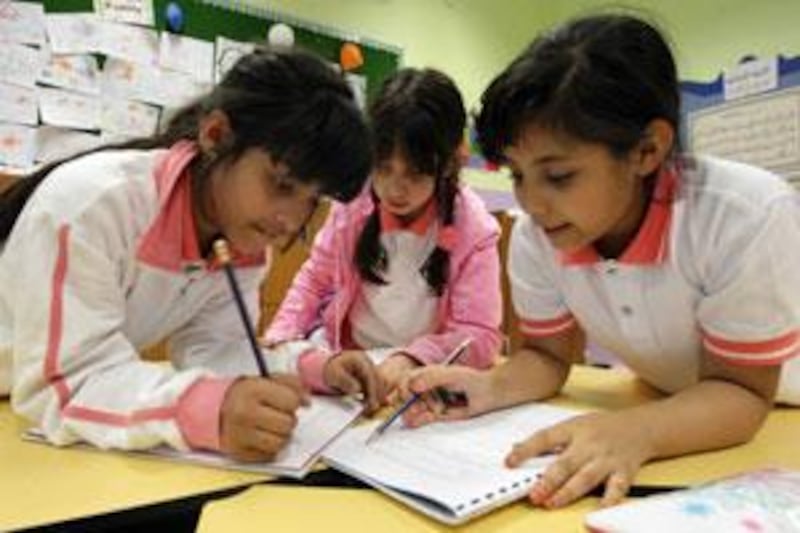DUBAI // So-called "model schools" are suffering from several problems, ranging from failing to attract Emirati teachers and bad hiring practices, some of their principals told the Minister of Education yesterday at a rare meeting to discuss their performance. However, education officials said they are generally happy with the experimental schools' overall performance.
Such schools have high pupil and teacher performance, parents are involved in school life and the institutions perform well in inspections, the educational officials said. Model schools began as an experiment in 1994. The state institutions were designed to have better-trained teachers and stringent admission requirements. Nearly 18,000 pupils attend about 40 such schools in Abu Dhabi, Dubai, Sharjah and Ajman.
The principals met with the minister, Humaid Mohammed Obaid al Qattami, in Dubai to review their performance. The principals told him the schools did not have enough Emirati teachers, particularly men, and there was little oversight over the training of teachers. Many teachers are hired haphazardly, the principals said. They also complained that there were no overarching regulations governing the schools, whose performances vary widely. The strict entry guidelines keep out most special needs students, the principals added.
"We suffer from the lack and scarcity of the Emirati element in schools," said Mohammed Ahmed, the principal of the Secondary Model School in Sharjah. In Al Ain, there were only two or three male Emirati teachers in model schools, said Mohammed al Hantoubi, the principal of Al Dahma Model School. The principals requested better guidelines to govern teacher training and the schools' management. Mr al Hantoubi said the lack of guidelines meant schools in Dubai and Sharjah still did not teach mathematics and science subjects in English.
"Unfortunately, teachers are hired without assessing them," he added. "Hiring is done directly without interviews to pick the best." More high-quality model schools are needed to stem the tide of Emirati students choosing private schools over public ones, he said. "We want real guidelines that aren't just paper," said Amal al Afifi, the principal of Al Mawaheb Model School in Abu Dhabi. The schools' high entry requirements, which stipulate scores of 85 per cent and higher in mathematics, English and Arabic, make it difficult to integrate pupils with special needs, the principals said.
"Special needs students who apply cannot get the scores," said Mona al Shaiba, the principal of Al Mushairaf Model School in Ajman. "Model schools should be ready to accept special needs students in a model environment. These schools can provide for the needs they have." It was Mr al Qattami's first meeting with model school principals since he took office last May. "This meeting is to find out the challenges they face and how we can find common solutions to improve these schools," he said.
"This meeting will lead to a number of recommendations that can raise the standards of education." Emiratisation would be a component of the ministry's reforms, Mr al Qattami said. "There is progress in females but a reduction in males for several reasons, like the trends in the job market as well as salaries and bonuses," he said. Across the school system in 2008, only 840 of 7,089 male teachers are Emirati. Among female teachers, 11,070 out of 15,601 are Emirati.
Mr al Qattami said it was disappointing that, after 15 years, model schools were still thought of as experimental. He said the ministry would look into creating a council to oversee the schools. His officials said implementing policies to improve pupil and teacher performance would take time. Shaikha al Shamsi, the acting chief executive for educational affairs, said: "If spending from the Government on the ministry increases, then we can see how we can balance the opportunities for the students in model schools and public schools so that they are equal."
@Email:kshaheen@thenational.ae







